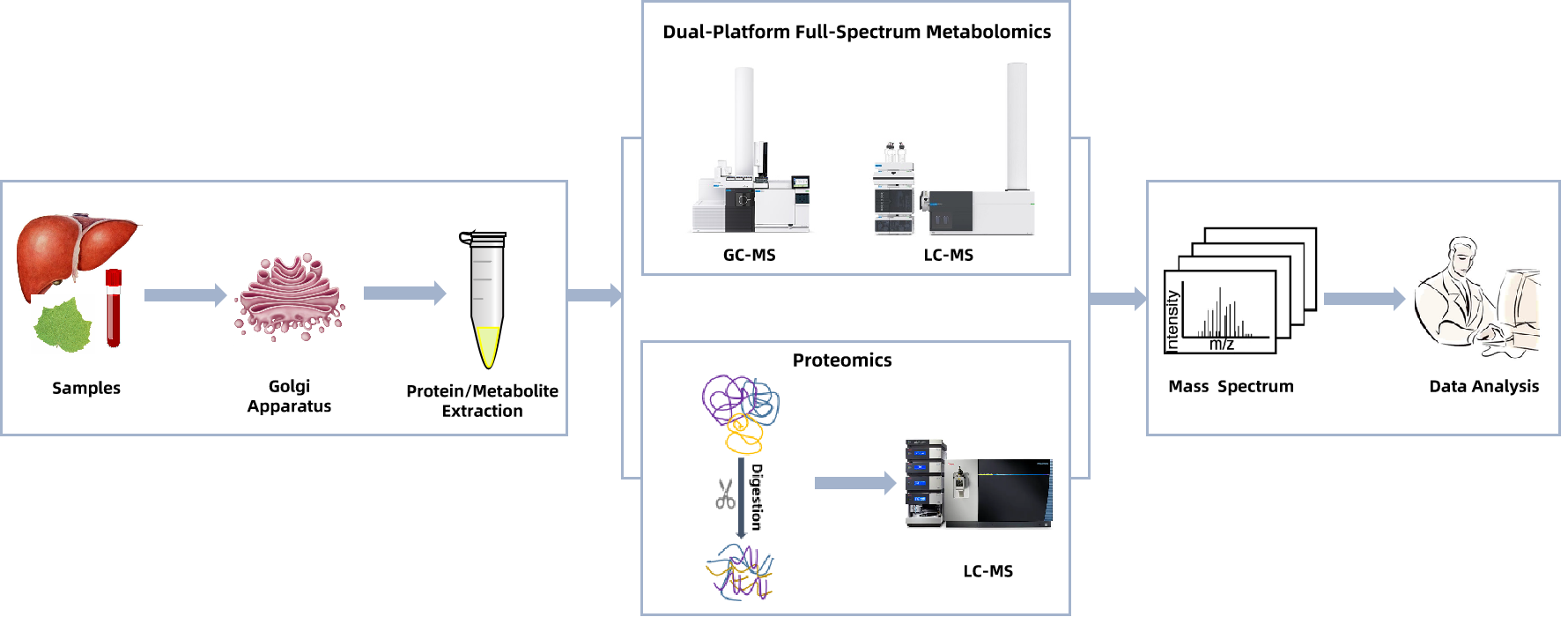Golgi Apparatus Analysis Services
- Cancer Biology: Investigate how Golgi stress and glycosylation reprogramming drive tumor progression.
- Virology: Elucidate how viruses hijack the Golgi for envelope assembly and intracellular trafficking.
- Congenital Disorders of Glycosylation (CDGs): Identify diagnostic markers and molecular defects in glycosylation pathways.
- Neurodegenerative Diseases: Explore how Golgi fragmentation and lipid dysregulation contribute to neuronal dysfunction.
- Biopharmaceutical Development: Optimize protein secretion, folding, and glycosylation for therapeutic protein production.
The Golgi apparatus is a dynamic, membrane-bound organelle central to intracellular trafficking, protein glycosylation, and secretion. Dysfunction of the Golgi is closely associated with various human diseases such as congenital disorders of glycosylation (CDGs), cancers, and neurodegenerative diseases. Systematic profiling of Golgi-resident proteins and lipids is essential for understanding their biological functions and disease relevance.
MtoZ Biolabs offers comprehensive Golgi Apparatus Analysis Services that integrate advanced organelle isolation strategies with high-resolution mass spectrometry and multi-omics workflows. Our services are designed to support discovery in cell biology, pathogenesis, and biomarker research.
Services at MtoZ Biolabs
As part of our Golgi Apparatus Analysis Services, MtoZ Biolabs provides the following solutions tailored to Golgi-centric studies:
· Organelle Enrichment and Isolation
High-purity Golgi fractions are obtained using sucrose density gradient centrifugation or immuno-isolation with marker proteins such as GM130.
· Proteomics Profiling
LC-MS/MS-based identification and quantification of Golgi proteins, including membrane components, glycosyltransferases, and transport regulators. Supports label-free, TMT, and DIA quantification.
· Glycoproteomics Analysis
Site-specific mapping of Golgi-associated glycosylation using enrichment workflows and high-sensitivity mass spectrometry. Enables assessment of glycan structure and occupancy.
· Lipidomics Analysis
Targeted and untargeted lipidomics analyses to characterize the phospholipid, sphingolipid, and sterol content within the Golgi.
Our Golgi Apparatus Analysis Services are compatible with a wide range of biological samples, including mammalian cells, model organisms, and plant tissues.
Analysis Workflow
Our Golgi Apparatus Analysis Services follow a streamlined and standardized five-step workflow:
1. Sample Submission and Preprocessing Consultation
We provide detailed guidelines for sample collection and storage and offer customized protocols based on species, cell type, or tissue.
2. Golgi Organelle Extraction and Quality Assessment
We isolate Golgi fractions using optimized protocols and assess purity via Western blot using markers such as GM130 or Golgin-97.
3. Proteomic and Lipidomic Analysis via LC-MS/MS
Samples undergo enzymatic digestion or lipid extraction and are analyzed using high-resolution mass spectrometry (e.g., Orbitrap, Q Exactive) coupled with Nano-LC systems.
4. Bioinformatics and Functional Annotation
We provide protein and lipid identification, quantification, pathway analysis, and subcellular localization assessment using publicly available databases and custom algorithms.
5. Comprehensive Report Delivery
Clients receive detailed analysis reports including quality control data, protein/lipid lists, statistical comparisons, functional annotations, and publication-ready visualizations.

Why Choose MtoZ Biolabs?
With our expertise in subcellular proteomics, MtoZ Biolabs offers the following advantages under the Golgi Apparatus Analysis Services framework:
✔ Advanced Analysis Platform: We utilize high-resolution Orbitrap and Q Exactive mass spectrometers combined with state-of-the-art Nano-LC systems to ensure high data quality.
✔ Cross-Species Sample Compatibility: Our platform supports mammalian cells, model organisms (e.g., yeast, zebrafish), and plant tissues, enabling versatile application across biology and medicine.
✔ High-Purity Organelle Extraction: With robust enrichment techniques and marker validation strategies, we ensure high-purity Golgi fractions suitable for sensitive downstream analyses.
✔ Integrated Multi-Omics Capability: We provide seamless integration of proteomics, glycoproteomics, and lipidomics data, supporting comprehensive insights into Golgi function.
✔ Full-Service Support: From experimental design to data interpretation, our experienced scientists offer end-to-end technical consultation to ensure research success.
Applications
The Golgi apparatus plays a central role in protein modification, secretion regulation, and membrane lipid transport, with its functional status directly linked to various pathological processes. MtoZ Biolabs' Golgi Apparatus Analysis Services offer crucial insights across various research domains:
To meet the diverse research needs at the organelle level, MtoZ Biolabs also offers comprehensive multi-omics solutions for other key organelles, including mitochondria, endoplasmic reticulum, peroxisomes, lysosomes, and nucleoli, enabling a systematic approach to subcellular functional analysis.
For more details on our Golgi Apparatus Analysis Services or to discuss customized research support, please contact the MtoZ Biolabs technical team.
FAQ
Q1: How can I confirm successful enrichment of Golgi organelles?
We recommend validating the isolated fraction via Western blot using Golgi-specific markers such as GM130 or Golgin-97. Marker intensity and purity will also be provided in the final report.
Q2: Can Golgi protein and lipid data be integrated with global proteomic datasets?
Yes. Our bioinformatics pipeline supports comparative analysis between organelle-specific and global datasets. By integrating subcellular localization data and enrichment scoring, we help clients build system-level Golgi protein or lipid maps for comprehensive understanding.
What Could be Included in the Report?
1. Comprehensive Experimental Details
2. Materials, Instruments, and Methods
3. Total Ion Chromatogram & Quality Control Assessment
4. Data Analysis, Preprocessing, and Estimation
5. Bioinformatics Analysis
6. Raw Data Files
Related Services
Endoplasmic Reticulum Analysis Services
How to order?







